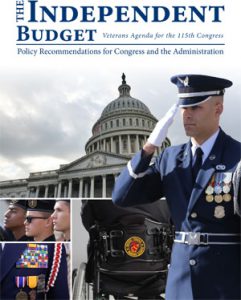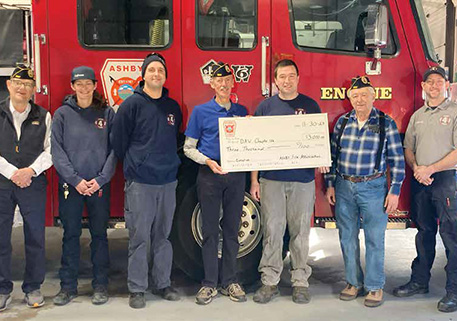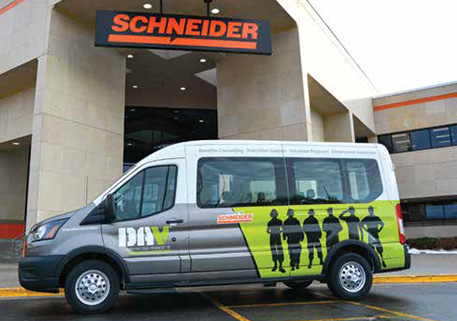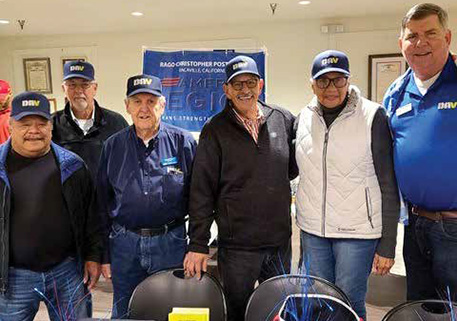 DAV, along with Paralyzed Veterans of America and Veterans of Foreign Wars, released in February The Independent Budget Veterans Policy Agenda for the 115th Congress (IB), outlining legislative and fiscal requirements for the programs, services and benefits administered by the Department of Veterans Affairs.
DAV, along with Paralyzed Veterans of America and Veterans of Foreign Wars, released in February The Independent Budget Veterans Policy Agenda for the 115th Congress (IB), outlining legislative and fiscal requirements for the programs, services and benefits administered by the Department of Veterans Affairs.
The veterans service organization (VSO) partners have developed and presented independent budget projections for veterans programs to Congress and the president for more than 30 years, to inform both lawmakers and the administration about the needs of veterans and to offer substantive solutions to address the many health care, transition and benefits challenges veterans face.
The recently released report lists six critical issues facing the veteran community and provides recommendations to lawmakers, the administration and the VA to address the following needs:
- Strengthen, reform and sustain the VA health care system.
- Reform the VA claims and appeals process.
- Realign and modernize the VA’s capital infrastructure.
- Improve the comprehensive assistance for family caregivers of severely injured veterans.
- Ensure the VA provides high-quality, effective programs and services to meet the unique needs of women veterans.
- Resolve budget restraints that negatively impact veterans programs.
“For the past two years we have been discussing these critical issues and making recommendations to reform VA’s health care and benefits system to ensure injured and ill veterans have access to timely and accurate benefits decisions and quality health care services,” said DAV National Legislative Director Joy Ilem. “Now is the time for action—we want to see Congress move forward and resolve these issues.”
The top three critical issues listed below are in line with DAV’s key legislative priorities for 2017:
Strengthen, reform and sustain the VA health care system
“The question of how to strengthen and reform the VA health care system was the dominant issue for VA, the House and Senate Committees on Veterans’ Affairs, and the veterans community during most of the 114th Congress,” said DAV Washington Headquarters Executive Director Garry Augustine. “Now it’s time for a long-term solution that reflects the consensus of virtually all of the major stakeholders. The best way to transform veterans health care is by creating an integrated network of VA and community providers, with VA serving as the coordinator and primary provider of care.”
According to the IB, “With the current veterans’ Choice Program scheduled to expire this year, and millions of America’s veterans continuing to choose and rely on VA for their medical care, it is time for Congress and the new administration to act and create the future VA health care system that America’s veterans deserve.”
Comprehensive support for caregivers
Congress enacted Public Law 111-163, requiring the Department of Veterans Affairs to provide comprehensive caregiver assistance and services to family caregivers of severely injured veterans. However, due to cost concerns, Congress limited participation in the program to veterans injured on or after Sept. 11, 2001.
Countless caregivers of veterans are not eligible for this critical benefit because of an arbitrary delimiting date. While progress was made last year on this issue, legislation was not enacted to resolve this inequity.
“After a lifetime of caregiving, many family caregivers are aging, and their ability to continue in their role is declining. They deserve benefits and services to mitigate the negative physical, emotional and financial consequences of caregiving,” said DAV Deputy National Legislative Director Adrian Atizado. “It’s now up to Congress to enact legislation to authorize comprehensive supports, benefits and services to family caregivers of severely ill and injured veterans of all eras.”
Reform the claims and appeals process
According to the IB, “The current backlog, dysfunction, and resource needs for the appeals process is the major driver for urgent fundamental reform. Much of the dysfunction within the appeals process relates directly to inadequate resources to efficiently process both claims and appeals simultaneously. Veterans Benefits Administration’s overall demands simply outpaced their capacity.”
IB recommendations to reform the claims and appeals process include comprehensive legislation to modernize, streamline and reform the benefit claims appeals process while fully protecting veterans’ rights.
“Legislation introduced in the last Congress—which was developed and agreed to by senior leaders of VA, the Board of Veterans’ Appeals, veterans groups and other stakeholders in 2016—must be enacted early in the 115th Congress to avoid further delays for veterans awaiting appeals decisions and to reduce the rising backlog,” said Augustine.
“It is ultimately up to Congress and the administration to make the right decisions on behalf of America’s veterans,” said DAV National Adjutant Marc Burgess. “It is our duty, as a collaborative VSO voice, to make sure lawmakers are educated and have all the facts necessary to make that happen. Now with new congressional leadership and a new president in the White House, we need to ensure we don’t lose the momentum we have gained on these critical issues to veterans and their families.”
Learn more online
Read more about the critical issues and IB recommendations to Congress to improve the lives of disabled veterans and their families at www.independentbudget.org.






